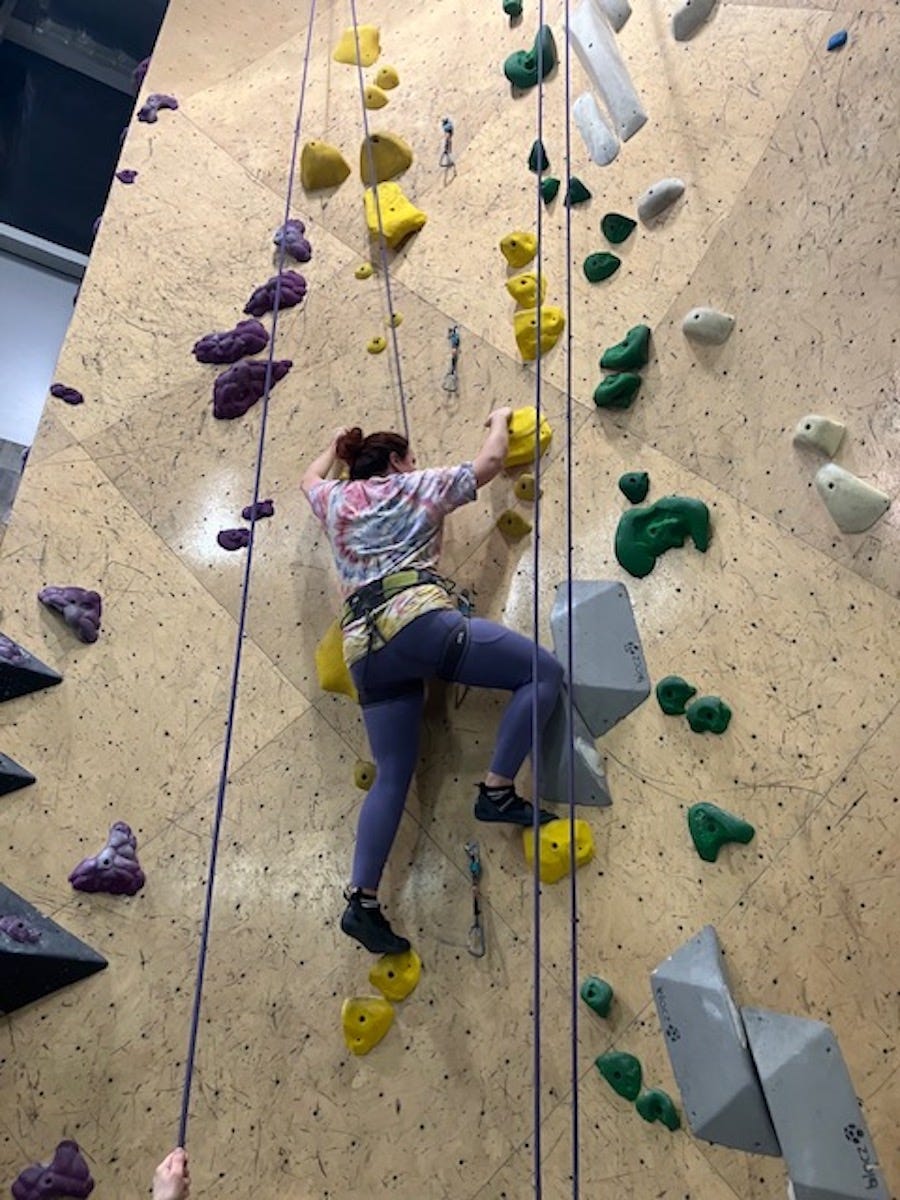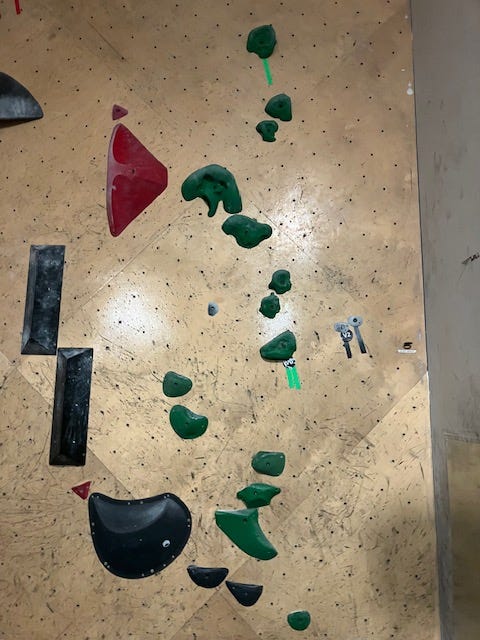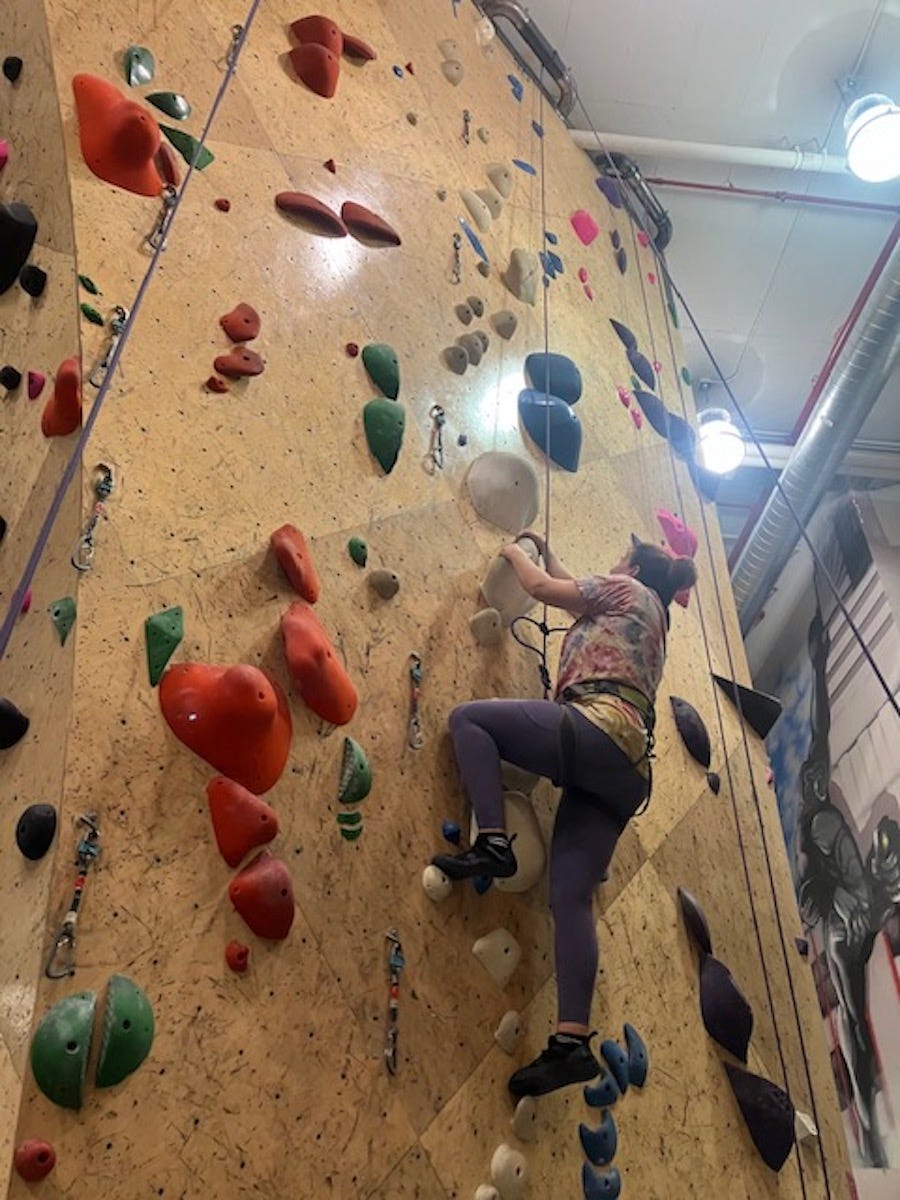15. Rock Climbing
The real wall is within.
Recently, a friend asked me if I’ve enjoyed any of the new things I’ve been doing because in their words there seem to be “a lot of duds.” My answer is that yes, there are definitely some things I’ve done so far that are new that I’ve enjoyed a lot, but some of the things I am doing now I never did because I knew I probably wouldn’t like them.
The hope I’ve had is that I will surprise myself and like something I didn’t think I could. What I did not expect was that doing things I thought I wouldn’t enjoy was not only not enjoyable, they made me confront unpleasant parts of myself I usually don’t. It’s possible that we avoid doing specific things because they make us face certain aspects of our personality we are otherwise not engaging with. They’re the knots in our psyche we don’t want to roll out.
This was very true for me with rock climbing. People I know who love rock climbing are obsessed with it. I remember being on a date with a woman who was sharing it was one of her favorite hobbies and I said as much to her.
“I can see how it must be extremely satisfying to slowly get stronger and more agile, and be able to measure your progress in such a clear way, it’s mentally challenging, and there’s a real social element, too, like everyone is gathered around and supportive,” I added, trying to put myself into the form-fitting shoes of a rock wall climber.
She shrugged, and said, “Yeah, that’s exactly it.”
“Yeah. Not for me.”
But why? Without having done it, the obvious reasons are that it’s physically hard, I don’t have much upper body strength, it’s dangerous, I don’t like heights, and I don’t see much practical application to rock climbing outside of climbing rocks.
Now, having done it, I can say it’s because I give up too easily.
My first rock climbing experience was at Brooklyn Boulders. I went with my friend Steven, and we both thought we were signing up for a ropes class. However, our instructor, Shirley, was not happy with the fact that I’d never freehand climbed anywhere and Steven had only done it once, so she insisted we start there. Actually, first we had to get the right equipment, including the special shoes. The first pair felt way too tight. I have very long toes, but being a woman, it can be hard to convince people to give me man-sized shoes when the situation arises. I asked for a bigger size. They felt exactly the same. I asked for a bigger size. They felt exactly the same, but now I felt like I was being pranked, so I wore them.
The energy at Brooklyn Boulders was very high school. This is probably because so many of the people there are under 25, but the whole space is also brightly painted like a public institution for children and there were lots of clique-y little groups watching each other or chatting or gathering by the lockers and it seemed like every surface was sticky with something contagious. Against type, Shirley was probably in her late forties or early fifties, and she told us she’d only started rock climbing during the pandemic. She was almost a foot shorter than me and wiry strong. I know I bang on about this a lot, but I do think that many people who are good at sports don’t take into account how their physiques led them to their particular activity. Having a long reach can be beneficial, of course, but it is simply easier to move your body up a sheer rock face when you are small and lean. If Shirley and I were to wrestle, however, I think I’d win.
We did not wrestle, though we did come close. She clearly had a lot of pride in her development since 2020, as she should regardless of genetic predisposition. She almost immediately told us she teaches a Climb Like a Girl class, a course that seems to be designed to encourage shy young women to come out of their shells and compete with the big boys on the belay rope. I’m glad those girls have that, but I personally hate it when someone assumes I’m bad at something because I’m a woman who has confidence issues around men. No! Unlike my feet, my incompetence is genderless. And though I fear men’s violence, I don’t fear their opinions. Shirley did not immediately get that she was barking up the wrong tree. Eventually, she took the hint and turned her attention to Steven, who is a natural climber.
First, she showed us how to fall, heads tucked in, butts out. Gamely, we practiced on the big mats, bouncing in the accumulated chalk dust. Then she explained how the colored rocks have their own language, rated with letters and numbers to indicate how complicated they were. Each path is a problem to solve, so it’s not just physical, it’s a riddle. Additionally, the lumps and bumps and squares and handles all have different types of grips carved into them, some that demand you cling like a baby on a dense boob, others with no more space than a finger’s grip to hoist yourself up.
I made it through the very easiest of the courses, but could already tell there was just one too many things at play here. My joints were creaking and my brain was going a mile a minute, flashing foreboding visions of all the ways I could hurt myself, land wrong, bones bending backwards, even the neck snapping. Realistically, I was only about two feet off the ground. Anxiety does not care about realism, so I was managing both things at once—the simple climb ahead of me and the overwhelming horrors of my imagination.
“Use your feet, your lower body,” Shirley tried to tell me. “Keep your body against the wall, don’t hang outwards.”
My long graceful toes could not support me on a one inch square of plastic. My glorious breasts pressed me out from the wall. It became funny to have the same tips iterated again and again, like if you told someone how to throw a three point shot and expected it to immediately translate into practical skill.
Within two to three trials, I pretty much gave up on all the courses before getting to the top. There would just come a moment where I thought, “I Can’t.” And I’d slither or bump my way back down. There are a lot of voices that tell us we can’t do things, and some of them we ignore. This was one I do not hear often, so I didn’t push against it. It’s maybe most similar to the feeling of starting some rote exercise that isn’t much fun and you aren’t in the mood. If you keep going, it will pass and you’re in the zone. Rock climbing does not allow you to check out long enough to cruise control over this hump. Every movement is a new challenge within the overall task, each choice asks you to say insistently, “I Can.”
Being present is one of the most difficult mental demands for me. It was like my mind just couldn’t do it one hand hold more, the threat of the next move, the insistence on my active participation in each decision, and the vision of falling all skittered together then ground everything to a halt. It didn’t really seem worth it to continue when I’d hit that block. I’ve been trying to think of things that are similar that did seem worth it that I’ve still managed to do, but there’s not a lot that’s comparable. And I’m sure there’s a reason for that. When meeting a limitation, it’s not easy to parse what is a lack of discipline versus ability. There are some people who have to prove to themselves that they can do anything when they find themselves failing. Even that—I wonder if it’s something they can’t help or if they’ve developed a practice of self-competition.
We moved on, heading to the ropes. Here, the walls went up so high. They were numbered again and we started on the simplest ones after getting into our harnesses. Though she was small, Shirley was able to sturdily manage us on the pulley connected to the ceiling. Steven did great, increasing in skill and difficulty levels. As I expected, I hit the block again and again, but I did enjoy the ropes more. There was slightly less fear of falling, though I could still imagine losing my grip and taking some nasty bumps in a slip up. I told Steven to take some pictures that made it look like I was high up.
“Lay on the ground,” I told him.
“I’ll go downstairs.”
I made it about half way up before kicking myself down again as Shirley slackened the rope, pretending to be Tom Cruise in a Mission Impossible movie, as you do. When I touched the ground, she and Steven were talking about how we’d met at an improv theatre and Shirley joked about how going on stage seems much scarier than climbing a wall.
“I fear bodily harm, not embarrassment,” I said, which is only partly true.
We turned in our harnesses and shoes and headed home. I was sick with a cold within days and I am convinced I got it from rubbing rock bacteria in my eye. Steven said he would probably never do it again, even given his aptitude. I think I would, if I fundamentally change as a person someday.
Because I am jealous of Shirley, who faced her first rock face and found something within herself that said “yes” instead of “no.”
I started watching these videos of a rock climber breaking down scenes in movies with rock climbing and they’re actually pretty fun.
This rock climbing scene from spin-off Fear the Walking Dead features two women who fall in love after starting as enemies, and it made me consider the usefulness of knowing how to climb in an apocalypse scenario. I think virtually useless, but you never know.
What have you tried to do that made you confront yourself lately? Details please
.





This made me laugh out loud so many times -- especially as someone who doesn't enjoy sports but seems to find herself doing them too. Thank you for your honesty and your dry humor.
I find it strange she had you do bouldering before the ropes, it's way harder and scarier, I don't care if you're just 1 foot off the ground. Maybe more experienced rock climbers know why this would be the case, but it sounds like a bad move to me!